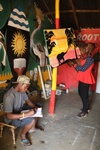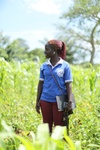I don’t remember very well how Kyangwali became my home
Our families were brought to Kyangwali in big lorries. The first time I arrived in Kyangwali, I had been on a lorry for two days.
I am originally from the Democratic Republic of Congo. I was born in the eastern part of the country in a village near Bunagana town. I left my home country for Uganda’s Kyangwali Refugee Settlement when I was six years old.
I remember coming in with my family and the vehicle entering the Bugoma forest. Kyangwali was in a thick, green forest near the equator. Baboons were all over. It was my first time seeing baboons, actually.
It was a terrifying experience.
When we first came, we were put in old school buildings. We were really worried.
Are we going to have a life here?
At first it was very, very hard. Every day, we heard the news, so-and-so has died, so-and-so has died. The ambulance siren scared everyone. Today, even when I am miles away from Kyangwali, my heart is troubled by the sound of a siren.
That’s when I decided to work very hard, to do whatever I could to change my situation. And my priority was to focus on my education. I worked hard in school.

A map of Kyangwali Refugee Settlement, as imagined and drawn by the artists of New Roots studio.
Creating Community: The Spark behind CIYOTA
It was around December 2005 when my friends, Benson Wereje, Daniel Muhwezi, and Bahati Kanyamanza, brought forward an idea: together, we can start a youth group that can help us to encourage each other, support each other.
Everyone brought their passion, everyone brought their talent to make this happen.
It was the coming together of COBURWAS, which would eventually become COBURWAS International Youth Organization to Transform Africa (CIYOTA).
At first, when the idea came, we wanted it to be a Congolese students’ association. But we realized that there were others in Kyangwali, from other countries, who were having the same problems. And we thought, we will make this program inclusive, a shared connection among the people.
And so we made it COBURWAS — which stands for Congo, Burundi, Rwanda, and South Sudan — to represent those countries, so that every youth, every child feels that he or she is an equal member of this program and shares in whatever solution we come up with.
In Kyangwali, refugees were given a piece of land to farm their own food to eat. Later, when we established ourselves as a youth organization, we were able to request land to farm and to build a youth centre, the COBURWAS Learning Centre.
So we farmed and raised money. We did tutoring programs, and then, slowly, many things happened. We registered students so that they could continue their secondary studies and opened a hostel program for students to access secondary school in the nearby town of Hoima. And we built COBURWAS School for Kyangwali’s children with our own hands, applying the mud and plaster onto the school walls in 2007.
Involving Community, Raising Incomes
While focusing on putting children in primary school and secondary school, we realized that there are so many barriers to the education of children in Kyangwali. That’s when we decided to add what we call “community-building” to our programs, to help families to increase their income through small businesses while also creating awareness of the importance of education and an entrepreneurial mindset and skill set for children in the community.
By involving parents, by involving the community, we were able to start feeding children at COBURWAS School and to have money to pay teachers.
These programs you are seeing in Kyangwali — whether it’s the anti-violence tailoring project, the small business training for out-of-school girls, the computer literacy training we are supporting, or the micro-loans we are granting — for us, we call it community-building. This work is the result of our realization that the community needs to have a certain level of income to be able to support education.
Building Leadership, Building CIYOTA
In 2008, I left Kyangwali. I went to African Leadership Academy (ALA) in Johannesburg.
I was recruited to ALA by Ivy Mwai, then ALA’s director of admissions for East Africa and who today leads the Mastercard Foundation’s work in Kenya. I still remember how big her smile was, how her energy made it easy for me to fit in. I was just from the village and most of the ALA finalists had attended some of the best schools in Uganda and had been exposed to more. Ivy remains my friend and mentor even today.
At ALA, I built my leadership capacity. I built my confidence. In school, in my leadership and entrepreneurship class, I could do prototype projects about the work I was doing in Kyangwali. My teachers gave me feedback, which built my understanding of what we were doing, and also encouraged me to apply this knowledge.
Some ALA teachers came to visit us in Uganda, as well as ALA students who participated in some of the youth training we were doing. They helped us build the content of our curriculum and approach. It was an exchange of knowledge with my fellow leaders at ALA.
CIYOTA By the Numbers
CIYOTA has educated over 1,000 children at the elementary level and over 700 young people at the secondary level. More than 40 young adults have attended universities globally, including 30 Mastercard Foundation Scholars and six at the African Leadership Academy. More than 100 young women have acquired valuable life skills and small business skills through training.
It was also ALA that recruited me to the Mastercard Foundation Scholars Program in 2012, which supported my studies at Westminster College in Fulton, Missouri.
Kyangwali Today: Building Community
Looking to the Future
CIYOTA has had huge success empowering youth in Kyangwali to set up their own projects in areas of education, farming, small business, and others.
But there is still more work to be done.
Kyangwali is one of many refugee settlements in Uganda and there are so many young people whose great potential is hindered by the lack of access to opportunities and resources.
Of all people, refugee children and youth should be given employment skills and entrepreneurial tools to start their own ventures for better futures. At CIYOTA, we want to give opportunities to young people who can’t access quality secondary and university education by building their capacity and helping them to access seed funding.
At CIYOTA, we know the power of education and livelihood enhancement as a pathway out of poverty. It is a way to heal conflict, create social cohesion, and spur economic growth.
Education for youth, built on a commitment to supporting families and the community, is at the heart of CIYOTA’s work in Uganda. And we hope that our model will continue to grow and impact refugees and underprivileged youth in Uganda and beyond.
At Home in Kyangwali
I don’t remember very well how Kyangwali became my home.
Going to secondary school, coming back to start working with other young people focused on building our better future — I started seeing Kyangwali as a home with more brothers, with more sisters.
We are seeing some light toward a better future.
After all, home is where you have a family.
Home is where you have a reason to live.























